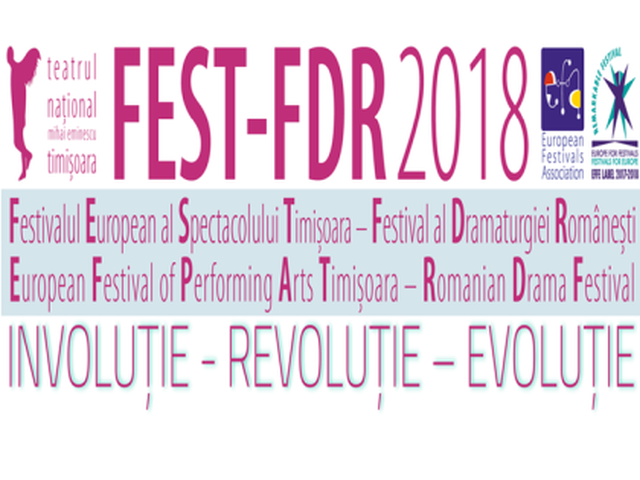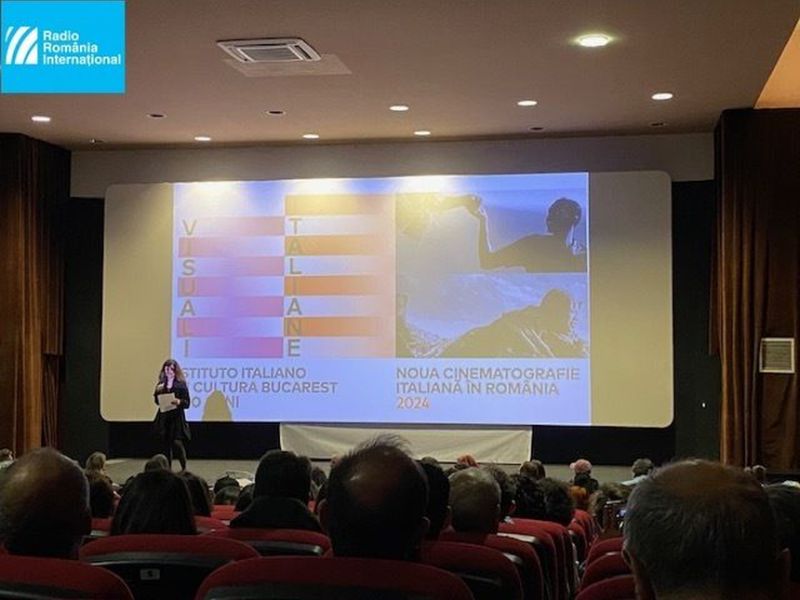Involution, Revolution and Evolution in Romanian and European Theatre 02/06/2018
Over May 5 and 13, the National Theatre in Timisoara played host to the 23rd edition of the European and Romanian Theatre, known as FEST-FDR.

Luana Pleşea, 02.06.2018, 16:00
This year’s theme was Involution, Revolution, Evolution, three words
that mark the way society and theatre help shape reality and build a future.
Theatre critic Oana Bors helped select the plays that were included
in the festival. Drawing on her experience, she believes Romanian theatre is
evolving:
Oana Bors: Romanian theatre is moving
forward, albeit taking small steps. First of all, we can notice a
diversification of topics – we no longer have a social and documentary focus
which dominated Romanian contemporary theatre at one point. Rather, Romanian
plays now approach various topics leading to introspection, such as human
relationships. There is also an evolution in terms of playwriting. We already
have accomplished playwrights, such as Csaba Szekely, Mihaela Michailov and
Radu Apostol, who have been working together for some time now… Also Alex Popa
has been steadily making a name for himself.
Acknowledgement and prejudice, identity and cohabitation, and above
all, love… These are the themes of George Stefan’s Story from Transylvania,
stage-directed by Andi Gheorghe at the Studio Act Multimedia Centre in Oradea.
The text tells the true story of a mixed Romanian-Hungarian family from Targu
Mures, spanning several generations.
The play is about Romanians and Hungarians living together and the
clashes of March 19-21, 1990 in Targu Mures. The play is bilingual and its cast
features both Romanian and Hungarian actors. Richard Balint plays Securitate
officer Stefan Remes, who investigates and eventually imprisons Szabados
Istvan, played by Kocis Gyula. The interesting thing about the play is that it
very much resembles the personal experience of the two actors. Richard Balint
with the details:
Richard Balint: At any rate, I’m both
Romanian and Hungarian. My father was Hungarian, my mother was Romanian, and I
myself have experienced the kind of situation where I got beat up for being
Hungarian. It was just the state of things back then. In 1990, during the March
events, I noticed a change in people’s attitude towards us. People who were
your friends, your neighbors, ended up fearing us. Tension was piling up in
Cugir.
In his turn, Kocis Gyula says:
Kocis Gyula: What personally affected me was that my father was imprisoned for
11 months in Oradea because he wanted to cross the border. The communists
locked him up because he wanted to be free.
The program for this year’s edition of the festival also included
the production Shakespeare for Ana, brought to Bucharest by the Coliseum Arts
Centre in Chisinau. It is a documentary show, exploring truth and love, drawing
on a series of interviews conducted in penitentiaries for juveniles, women and
men in Goian, Rusca and Soroca villages.
The play was written and staged by Luminita Tacu, who is well known
for her interest in documentary theatre. This was not the first show based on
testimonials for actress and director Luminita Tacu.
Luminita Tacu: In 2008 I directed the play ‘The House of M’, which included a
monologue of a woman who had killed her husband. So years later I started
wondering what the women I spoke to in Rusca prison were doing. We had worked
together for ‘The House of M’, which deals with domestic violence, and I
wondered what it’s like to live without love. What is the life of these women
in Rusca? I knew they have children waiting for them back home, some of them
husbands, others looking for love. I also knew some of them were looking for
love in prison. That’s how I got the idea about making a show about love, a
show about this kind of virtually impossible love. We decided to go to three
vulnerable penitentiaries. We talked to the inmates, but also to the employees
in the system. It’s a bloodcurdling play, even for us, because every time we
get transported back to that world, it reminds us of all those people. Every
time it fills us with regret and remorse for living in freedom, forgetting that
somewhere out there, in a world behind bars, there is someone you know, someone
you talked to about love…
The
European Theatre section of the FEST-FDR Festival was represented by important
theatre companies from Europe. Oana Bors with the details:
Oana Bors: I am glad the festival has
been gaining international recognition. There are big theatre companies coming
to Timisoara. We were honored to have director Milo Rau as a guest, who staged
a play jointly with the famous Schaubuhne Theatre in Berlin. In turn, Luk
Perceval’s ‘The Grapes of Wrath’ was staged as part of the festival in a modern
reinterpretation produced by Thalia Theatre. Whereas Milo Rau’s play is a
docu-drama analysis on migration, Luk Perceval’s’Grapes of Wrath’ picks up on
Steinbeck’s focus on economic hardship and examines the issues of exile and
identity.





























